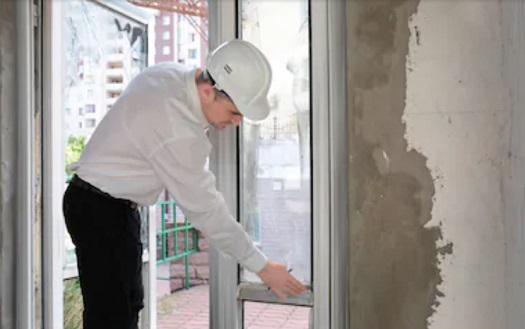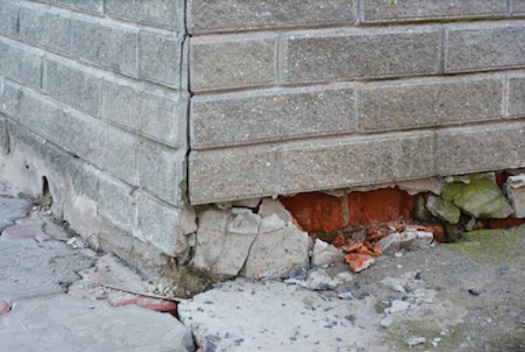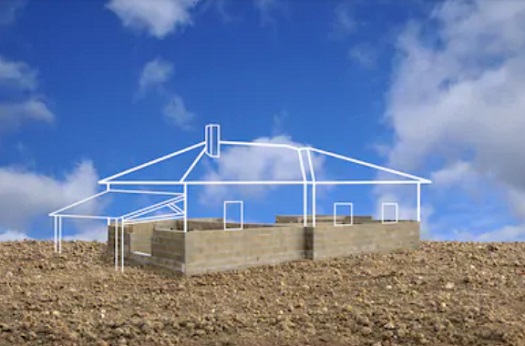Finding the right house to buy can be tricky. You have an idea of what you’re looking for – neighborhood, curb appeal, number of bedrooms, features, and fixtures. But what happens when you look past the basics, see through the staging, and assess the structure itself? It could be that the house you’ve chosen to make an offer on could have a faulty foundation.
The foundation supports all of the weight of the structure on it. There can be serious risks involved in residing in a house whose foundation no longer holds the pressure. On the other hand, you could find a home for an excellent price. The question is: does your budget allow for repairs, and can you handle the stress involved?
Every house experiences an average amount of settling. Homes with foundational problems outside of the scope of settling may be more common in certain parts of the country. Some areas may be more prone to foundation issues based on the soil or clay quality. In fact, 60% of all houses constructed on expansive soils suffer from foundation distress. But those troubles aren’t always insurmountable.
When you think you’ve found the right house to buy and you’re thinking of submitting an offer, investigate a little deeper than the floor plan. Look at the windows, doors, floors, and where the walls meet the baseboards or the ceiling. Do you see cracks? Do the windows and doors get stuck or not open correctly? These could be signs of foundation failure. Can you overcome foundation issues, or is that a deal-breaker?
Here’s what you need to know about buying a house with foundation problems:
- Don't Fall in Love Just Yet
- How to Spot Potential Foundation Problems
- What Causes Foundation Problems?
- The Difference Between a Home Inspector and a Structural Engineer
- Beyond the Foundation | The Root of the Problem
- Repairs and Negotiations
- Financing a House with a Faulty Foundation
- Your Living Arrangements
- Conclusion
- ☎️ Contact The Vaughan Team
Don’t Fall in Love Just Yet
The home you want to make an offer on may be situated in the perfect neighborhood, with all the right features, and is at or below your price point. But don’t emotionally move in just yet. While the house may look picture-perfect thanks to clever staging, there could be problems with the foundation.
It’s easy for a homebuyer, especially a first-time buyer, to emotionally attach to a property and then feel devastated if that deal falls through. Sentiment could cloud logic. Don’t lose sight of the fact that this is a business transaction, and you won’t know immediately if the damage you spot is minor or severe.

If an inspector reveals foundation failure, you need to reconsider your offer carefully – not necessarily turn away, but just carefully consider. Although some problems may be repaired relatively quickly and cost-effectively, others may be more than you’d bargained for.
Fixing foundation problems could be as inexpensive as $500 for minor repairs, around $10,000 for a substantial amount of maintenance, and up to $100,000 for the entire foundation to be replaced.
How to Spot Potential Foundation Problems
When you tour homes, keep a sharp eye out for any signs of foundation weakness.
Signs of foundation damage could include:
• Doors or windows that don’t open properly
• Gaps above windows, doors, or the garage
• Broken tile
• Uneven floors
• Displaced moldings
• Foundation pulling away from the soil
• Visible horizontal cracks in the foundation
• Stair-step cracks in the exterior bricks
• Chimney leans away from the structure
• Sunken porches or stairs
• Moisture in crawl spaces or basement
• Standing water
You shouldn’t need to worry about cracks that measure 1/4 inch or smaller, but anything more extensive could be a clue to past or present damage.
Some people suggest testing concrete with a few pokes of a screwdriver. Concrete should be solid and shouldn’t chip or breakaway. Weak concrete could indicate that the original cement was faulty – in which case, the only solution is replacing the entire foundation.

Ask the seller if the house experienced former foundation issues or repairs.
If the house has recently had work done to the foundation, this could be a good thing, not necessarily a cause for concern.
Your real estate agent also has a keen sense for eye-spying problematic areas in houses for sale. Before you tour homes, talk with your real estate agent about the possibilities of structural damage and its telltale signs.
What Causes Foundation Problems?
A home’s foundation may falter for several reasons. Some damage is minor and can be patched pretty quickly, but other causes are more complex, more time consuming, and more expensive.
• Sometimes, hot weather is the culprit of foundation damage, which causes evaporation, and, in turn, causes the soil to shrink under the foundation.
• Tree roots can grow under and into the foundations of a house. Trees and plants can also experience transpiration, which is when the roots suck up water, also causing the soil to shrink and the structure to shift.
• Plumbing leaks are responsible for many faulty foundations. These water drips can cause foundation walls to move.
• Poor construction, inferior ground preparation, and poor soil can contribute significantly to the weakness of a home’s foundation.
• One of the more common reasons for foundation failure is improper drainage, where excess moisture causes erosion.
And these are just of the few causes for foundation damage in a house. To know more about the extent of foundation damage, you’ll need to bring in an expert.
The Difference Between a Home Inspector and a Structural Engineer
Most houses, during the sales process, must have a home inspection. While a standard home inspection may reveal some foundation problems, it’s geared more toward the property’s overall condition. A standard home inspector will check:
• Foundation
• Building Structure
• Interior
• Exterior
• Electrical systems
• Plumbing
• Heating and cooling
• Insulation and ventilation
On the contrary, a structural engineer solely focuses on the stability of the structure. As opposed to a strictly visual and subjective home inspection, a structural engineer maps out the foundation, framing, and roofing, surveying at each floor level. The structural engineer looks at:
• Foundation
• Floor structure
• Walls
• Ceiling
• Roof

It’s essential to have the right inspection, so you have a deep and thorough understanding of the level of damage.
In most cases, the seller won’t mind if you ask for a structural engineer to inspect the property, especially if there are already visible signs of damage. And, if the seller refuses, that could be a big red flag to back away from that property.
Beyond the Foundation | The Root of the Problem
Sadly, foundation issues aren’t always the root problem. They’re usually only a symptom of another problem in or around the structure.

When you find defective areas in a home’s foundation, you have to fix the foundation, for sure. But if you don’t locate and fix the source of the damage, you’ll find yourself in the same scenario eventually because the erosion continues. And since you won’t be sure of the severity of the real problem without further investigation, you won’t know how big of a financial bite you’re taking, or the stress of repairs.
To locate the source of the damage, you may have to call in other contractors, which is another expense.
Talk with your real estate agent about possible contingencies that may protect you in your purchase.
Repairs and Negotiations
It’s tempting to allow the seller to make repairs before you take ownership of the property. But there’s risk in that move.
When you think about repairs for your home, your aim is for quality work that will stand the test of time. After all, you’re investing substantially in the purchase of the house, and you’ll be living on the property for the next several years, if not decades – unless you’re flipping the house.

On the other hand, the seller might be more motivated by time and money-saving endeavors or shortcuts. It may be more beneficial to negotiate a lower price to allow you to make the repairs after you move.
Trust your real estate agent to guide you in the process of knowing if the damage is too substantial to overcome, or if it’s worth the bargain price you could negotiate.
Financing a House with a Faulty Foundation
You might be willing to take on a home that needs work to the foundation, but your lender might not.
Banks tend to shy away from properties that carry too much risk. Although the damage isn’t always extensive and could easily be fixed, the financial institution backing the loan could choose not to go on the journey with you – even if you’ve been pre-approved for a home mortgage loan.
HUD and VA loans are particularly stringent in their requirements, so they may be less willing to loan you the funds than traditional lenders.
Those lenders that do approve loans for homes with foundation damage are likely to charge a higher interest rate.
However, you may be able to qualify for an FHA 203(k) renovation loan, which permits you to borrow a larger amount of money than the purchase price of the home.

Check with your lender before house-hunting to determine whether or not a foundation-related fixer-upper is a realistic option.
You may also be surprised to discover that your homeowner’s insurance policy likely won’t foot the bill for foundation repairs. The exception to this rule is in the event of disasters such as tornadoes, explosions, earthquakes, or fire.
Check with your homeowner’s insurance representative to find out whether or not the insurance company can help carry some of the financial weight of repairing your foundation.
You might also be able to obtain a secondary insurance policy that does cover other types of damage, such as the foundation of a structure.
Your Living Arrangements
If you’re able to find a steal of a deal on a house with foundation issues, and you feel the problems are manageable, you can focus on making repairs. Most likely, you won’t be able to stay in the house while extensive work is done to the foundation — and to the cause of its deterioration.
Conclusion
Houses with damaged foundations aren’t uncommon. You just have to decide if foundational problems are within your means to finance and also repair.
Check the structure of homes as you tour them. Don’t just look for the pretty parts.
Enlist the expertise of a structural engineer, not a standard home inspector
If your inspector finds damage, understand that the deterioration is not the problem – what’s causing the erosion is. You’ll not only need to pay to repair the foundation but also whatever malfunction caused it to weaken.
Faulty foundations can happen by way of trees and plants, improper water drainage, plumbing issues, poor construction, insufficient concrete, or even the weather.
Your lender may show resistance to loaning funds for a property whose foundation is unsteady. Know your financial institution’s terms and interest rates before you submit an offer.
Your most valuable resource when searching for a house to buy is your real estate agent. Real estate agents have experience in knowing what to keep an eye out for regarding potential structural damage, and how to advise you if that happens.
It can be risky to buy a house whose base is questionable, but it can also be a great bargain and a simple fix.
☎️ Contact The Vaughan Team


